Unit2GreatpeopleGrammar江苏省永丰初级中学牛津译林版英语九年级下册课件(共44张PPT)
文档属性
| 名称 | Unit2GreatpeopleGrammar江苏省永丰初级中学牛津译林版英语九年级下册课件(共44张PPT) |
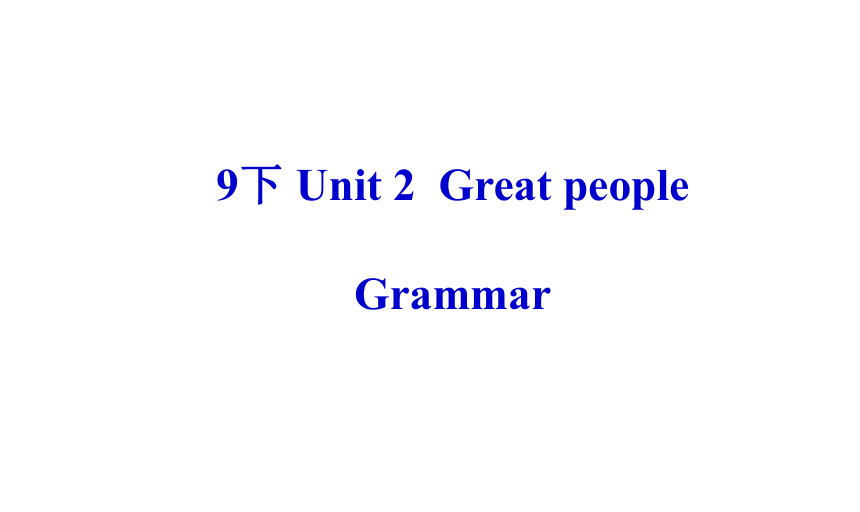
|
|
| 格式 | zip | ||
| 文件大小 | 826.5KB | ||
| 资源类型 | 教案 | ||
| 版本资源 | 牛津译林版 | ||
| 科目 | 英语 | ||
| 更新时间 | 2022-05-19 00:00:00 | ||
图片预览


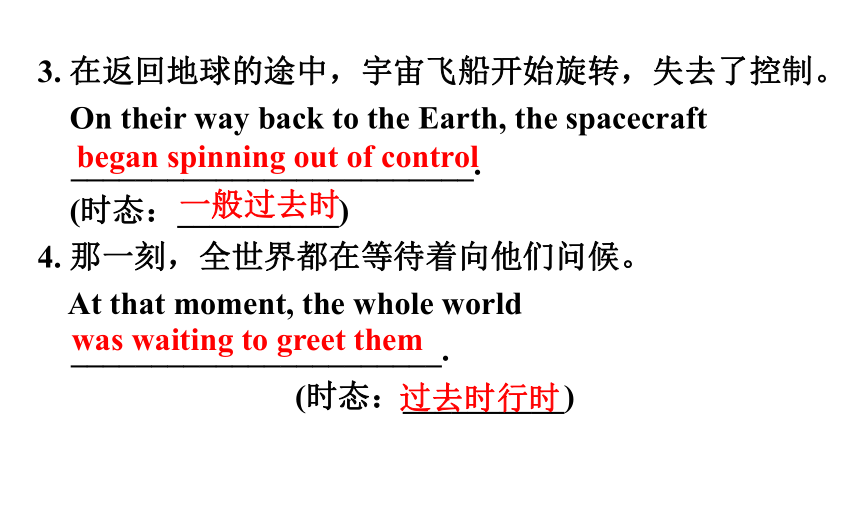
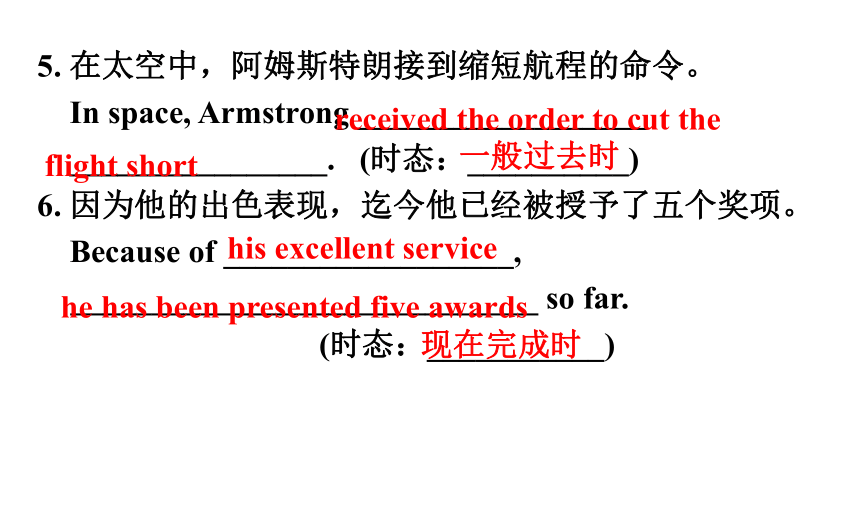


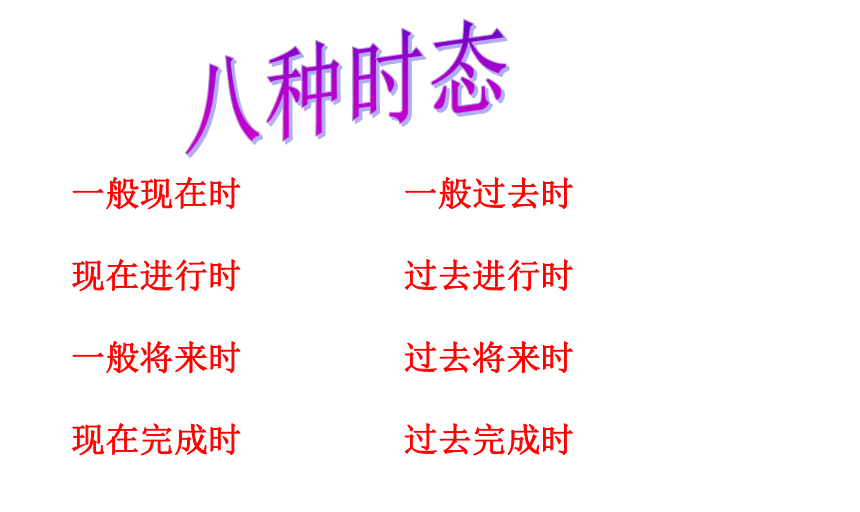
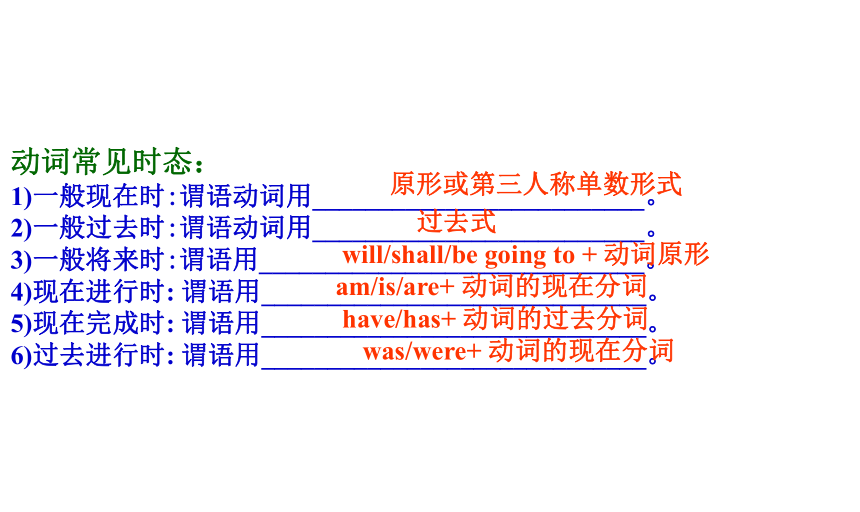
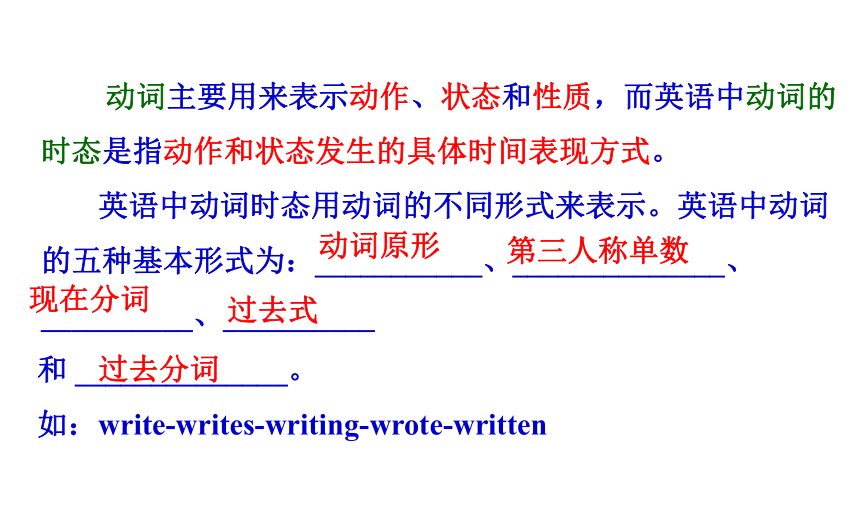
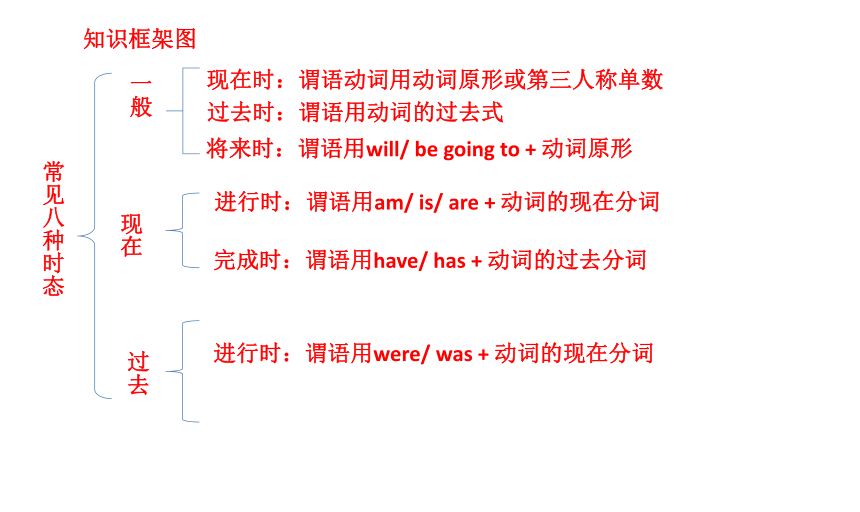
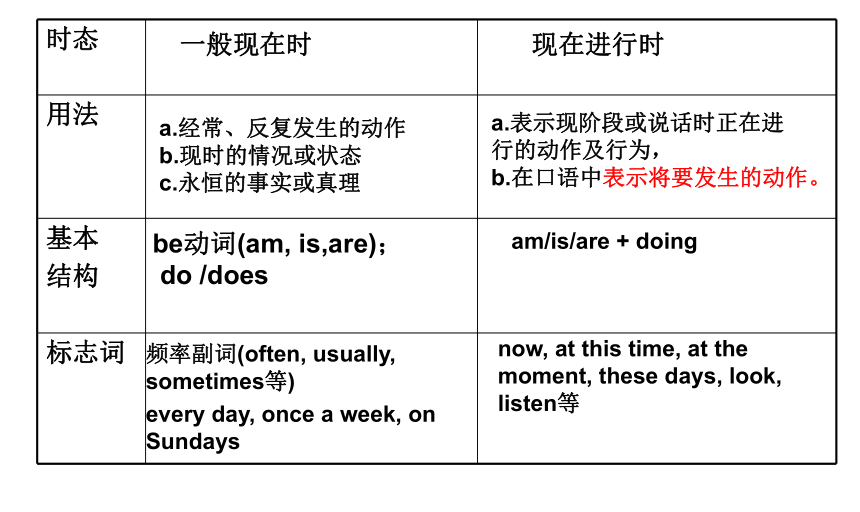
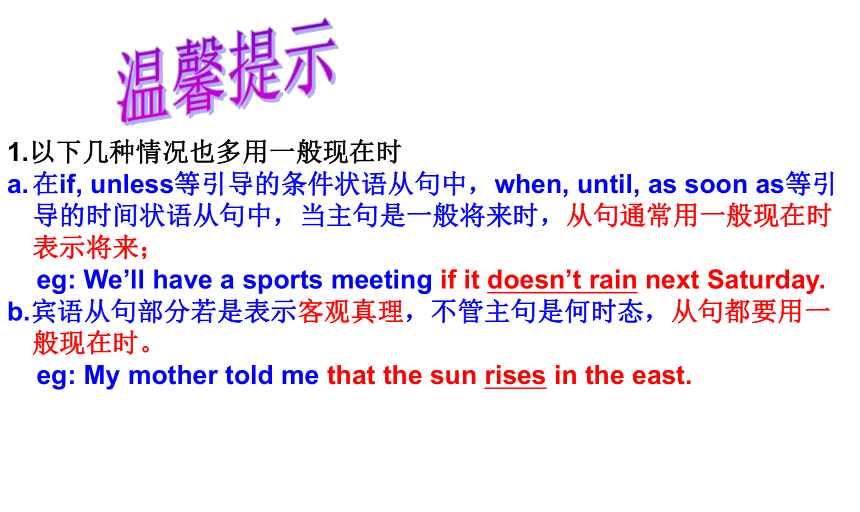
文档简介
(共44张PPT)
9下 Unit 2 Great people
Grammar
Translate the following sentences and tell what tense is used in each sentence.
1. 他总是设法独自做每一件事。
He always _________________________
____________. (时态:__________)
2. 宇航员们目前为下一次飞行做准备。
The astronauts ______________________
______ at present. (时态:___________)
manages to do everything by himself
一般现在时
are preparing for the next flight
现在进行时
3. 在返回地球的途中,宇宙飞船开始旋转,失去了控制。
On their way back to the Earth, the spacecraft _________________________.
(时态:__________)
4. 那一刻,全世界都在等待着向他们问候。
At that moment, the whole world _______________________.
(时态:__________)
began spinning out of control
一般过去时
was waiting to greet them
过去时行时
5. 在太空中,阿姆斯特朗接到缩短航程的命令。
In space, Armstrong __________________
________________. (时态:__________)
6. 因为他的出色表现,迄今他已经被授予了五个奖项。
Because of __________________, _____________________________ so far.
(时态:___________)
received the order to cut the flight short
一般过去时
he has been presented five awards
现在完成时
his excellent service
英语动词时态复习
Look! They ____________.(swim)
Jim usually ______(walk) to school, but yesterday
he ____(take) a bus.
3. Kelly ___(be) a student now, she ______(be)
a doctor in ten years.
4. Our life ___________(change) a lot in the last
few years.
5. When my father came in, I ___________(watch) TV.
6. He said he ___________(return) the next week.
7. By the time I got outside, the bus _______(leave)
already.
are swimming
walks
took
is
will be
has changed
was watching
would return
had left
时态填空
一般现在时 一般过去时
现在进行时 过去进行时
一般将来时 过去将来时
现在完成时 过去完成时
动词常见时态:
1)一般现在时:谓语动词用_________________________。
2)一般过去时:谓语动词用_________________________。
3)一般将来时:谓语用_____________________________。
4)现在进行时: 谓语用_____________________________。
5)现在完成时: 谓语用_____________________________。
6)过去进行时: 谓语用_____________________________。
原形或第三人称单数形式
过去式
will/shall/be going to + 动词原形
am/is/are+ 动词的现在分词
have/has+ 动词的过去分词
was/were+ 动词的现在分词
动词主要用来表示动作、状态和性质,而英语中动词的时态是指动作和状态发生的具体时间表现方式。
英语中动词时态用动词的不同形式来表示。英语中动词的五种基本形式为:___________、______________、__________、__________
和 ______________。
如:write-writes-writing-wrote-written
动词原形
第三人称单数
现在分词
过去式
过去分词
常见八种时态
一般
现在时:谓语动词用动词原形或第三人称单数
过去时:谓语用动词的过去式
将来时:谓语用will/ be going to + 动词原形
现在
进行时:谓语用am/ is/ are + 动词的现在分词
完成时:谓语用have/ has + 动词的过去分词
过去
进行时:谓语用were/ was + 动词的现在分词
知识框架图
时态
用法
基本
结构
标志词
a.经常、反复发生的动作
b.现时的情况或状态
c.永恒的事实或真理
a.表示现阶段或说话时正在进 行的动作及行为,
b.在口语中表示将要发生的动作。
频率副词(often, usually, sometimes等)
every day, once a week, on Sundays
now, at this time, at the moment, these days, look, listen等
am/is/are + doing
be动词(am, is,are);
do /does
一般现在时
现在进行时
1.以下几种情况也多用一般现在时
在if, unless等引导的条件状语从句中,when, until, as soon as等引导的时间状语从句中,当主句是一般将来时,从句通常用一般现在时表示将来;
eg: We’ll have a sports meeting if it doesn’t rain next Saturday.
b.宾语从句部分若是表示客观真理,不管主句是何时态,从句都要用一般现在时。
eg: My mother told me that the sun rises in the east.
2.动词第三人称单数形式的变化规则
规 则 举 例
一般情况下直接加-s read—reads write—writes
run—runs swim—swims
以-ch, -sh, -s, -x或-o结尾的词加-es teach—teaches wash—washes
go—goes
以“辅音字母+y”结尾的词变y为i再加-es, 但“元音字母+y”则直接加-s try—tries carry—carries
study—studies stay—stays
play—plays say—says
3.现在分词的变化规律
规律总结 例 词
以不发音的e结尾的动词去e再加-ing make→making
have→having
以一个单独发音的元音字母+一个辅音字母结尾的重读闭音节要双写最后一个辅音字母再加-ing swim→swimming
run→running
以-ie结尾的动词, 变ie为y, 再加-ing lie→lying
tie→tying
不符合上述情况的直接加-ing play→playing
sing→singing
初中阶段常见的需要双写最后一个辅音字母变现在分词的动词有: shop, stop, drop, run, get, sit, dig, put, begin, swim, chat, prefer。
Finish the exercises on P26.
am having
need
is shopping
shops
is searching
is visiting
is reading
is watching
want
go
1.—What is your brother going to be when he _____
--He is going to be a doctor.
A. grew up B. grows up C. grow up D. growing up
2. Please call me as soon as you ______ to Beijing.
A. will get B. gets C. get D. getting
3.– My mother is cooking while I _______my homework.
A. am doing B. was doing
C. do D. did
4. Li Ming ______ the dormitory. He is sleeping.
A. cleans B. isn’t cleaning C. is cleaning D. cleaned
时态
用法
基本
结构
标志词
过去的动作或
状态。
一般过去时
过去进行时
was/were+doing
yesterday,
three days ago,
last night/week
just now…
at that time,
at this time yesterday,
when, while…
过去某时正在进行
的动作
be(was\were)
did
动词过去式的变化规则及读音
一般过去时常用动词的过去式表示。不规则动词的过去式有其特殊形式, 要特别记忆。be动词的过去式为was/were。规则实义动词的过去式是在动词原形后加-d或-ed, 其变化规律见下表:
例 词 规律总结 读音规则
play→played;
help→helped 一般直接加-ed ①清辅音后读
/t/, 如helped, laughed
②浊辅音、元音后读/d/, 如lived, stayed
③/t/和/d/后读
/Id/, 如needed, started
move→moved;
use→used 以不发音的e结尾的加-d
study→studied;
carry→carried 以辅音字母加y结尾的变y为i再加-ed
stop→stopped;
fit→fitted;
fix→fixed 以一个元音字母加一个辅音字母(x除外)结尾的重读闭音节双写结尾字母再加-ed
句式变换
肯定式 疑问式 否定式
I worked. Did I work I did not work.
He (She, It) worked. Did he (she, it) work He (She, It) did not work.
We (They, You)worked. Did we (they, you)
work We (They, You)
did not work.
Finish the exercises on P27.
was watching
won
was writing
sent
was practising
took
found
was reading
were playing
was talking
called
wasn’t
They _____in London at that time.
A. are having B. having C. were having D.had
2. My friend ______to Qingdao last month.
A. moved B. moves C. has moved D.moving
3. –Why didn’t you play soccer with us
-I _____my sister then.
am looking after B was looking after
C. look after D. looked after
4. There ____nothing new in yesterday’s paper.
A. Is B. are C. were D. was
时态 一般将来时
用法
基本
结构
标志词
将来要发生的动作
或状态
will+ do
am/is/are+going
to do
tomorrow, the day
after tomorrow
next week/ month
If you are late for school, the teacher __angry.
will be B. is C. are D. was
2. The Greens ____for Shanghai next month.
is leaving B. left C. are leaving D. leaves
1.用法:
1
2
现在完成时
现在完成时
过去
现在
过去的动作对现在的影响。
I have finished my homework.
过去的动作持续到现在。
I have studied English for six years.
3.标志词:
already, just, yet, ever, never, recently,
in the past 3 years, before, so far/by now,
over the years
since+时间点/过去时态的句子,
for+时间段
2.基本结构:
have/has+ done
1
2
1. I lost my keys yesterday.
2. I have lost my keys, I can’t
open the door now.
4.现在完成时和一般过去时的异同点:
共同点:动作都在过去。
不同点:和现在有无关系。
(与现在有关的过去动作用现在完成,
与现在无关的过去动作用一般过去。)
5.易错点:
have/has gone to 表示“去了某地”
have/has been to 表示“去过某地”
have/has been in 表示“来/去某地多久”。
1.-Where is Tom
-He ____________Europe.
2. Tom ____________Europe twice.
3. Tom ____________Europe for five days.
has gone to
has been to
has been in
6.瞬间动词和延续性动词
若句中出现时间段,则必须使用
延续性动词。
e.g. Her lovely dog _______________for 10 days.
begin/start be on come
die leave
buy become
join be in/a member of borrow/lend
be dead
have
be in/at
be away(from)
be
keep
has been dead
瞬间动词和延续性动词转换关系如下:
常见非延续性动词与延续性动词的转化对照表
非延续性动词 延续性动词 非延续性动词 延续性动词
borrow/lend keep die be dead
open be open close be closed
buy have join be in/a
member of
leave be away
(from) finish/end be over
begin/start be on arrive/come be here/ in
catch/get a cold have a cold marry be married
Finish the exercises on P28.
have made
have changed
used
has solved
washed
was
took
have had
travelled
have made
I won’t see the film with you because I
_________(see)it already.
2. Great changes ________________(take place)
in our country since 1978.
3. Jim isn’t here. He ________(go) to the library.
4. –How long _____you ____(买) the bike
5. The Greens ___________(来)China for 5 years.
6. They _______ in 2000.
They ________________for 12 years. (结婚)
have seen
have taken place
has gone
have
had
have been in
married
have been married
中考动词时态考试技巧:
做动词时态题的时候要注意以下几个方面:
1.根据时间状语确定时态
2.根据上下文已有时态信息点确定时态
3.上下文语意确定时态
4.在复合句根据时态呼应确定时态
5.时态中的“特殊”对策
根据时间状语确定时态的原则:
Every summer many foreigners _____ to Hainan for vacations.
A. comes B. came C. come D. coming
Every summer
根据上下文已有时态信息点确定时态的原则:
2. –Is your mother a nurse
--Yes, she is. She ____ in Town Hospital.
has worked B. works
C. worked D. working
Is
利用上下文语意确定时态的原则:
3. –Where’s your mother, Lucy
--She _____ TV in the room.
watches B. watched
C. is watching D. watching
’s
在复合句根据时态呼应确定时态的原则:
4. Do you know if he back next week If he back, please let me know.
comes; will come
B. will come; will come
C. will come; comes
D. comes, comes
if
a.If引导宾语从句,“是否”,…
b.If引导状语从句,“如果”…
If
时态中的“特殊”对策的
原则:
5. The teacher told us yesterday that December 25 Christmas Day. (2009辽宁)
is B. was
C. has been
宾语从句表示客观真理,时态不受主句限制而用一般现在时
December 25 Christmas
Day
综合填空
-Where is Li Ming -He ___________to
some foreign music in bed.
2. I _____a friend of mine when I was walking
down the street.
3. They ____________on line when I came in.
4. Don’t bring the mobile phone to the class
-room, or it ________________.
5. People ___________a lot of trees over the
years.
6. There_______an important test in two days.
7. The boy often _________the students’ exercise
books for the teacher.
hand out, listen, take away, chat, meet, be, plant
is listening
met
were chatting
will be taken away
have planted
will be
hands out
动词的时态结构歌谣
一般现在时,动词用原型
单数三人称,动词加“s”
一般过去时,动词加“ed”
现在进行时, am,is,are加doing
过去进行时,was,were加doing
一般将来时,will加原型
过去将来时,would加原型
现在完成时,have/has加过分(p.p.)
过去完成时,had 加过分
Thank you!
9下 Unit 2 Great people
Grammar
Translate the following sentences and tell what tense is used in each sentence.
1. 他总是设法独自做每一件事。
He always _________________________
____________. (时态:__________)
2. 宇航员们目前为下一次飞行做准备。
The astronauts ______________________
______ at present. (时态:___________)
manages to do everything by himself
一般现在时
are preparing for the next flight
现在进行时
3. 在返回地球的途中,宇宙飞船开始旋转,失去了控制。
On their way back to the Earth, the spacecraft _________________________.
(时态:__________)
4. 那一刻,全世界都在等待着向他们问候。
At that moment, the whole world _______________________.
(时态:__________)
began spinning out of control
一般过去时
was waiting to greet them
过去时行时
5. 在太空中,阿姆斯特朗接到缩短航程的命令。
In space, Armstrong __________________
________________. (时态:__________)
6. 因为他的出色表现,迄今他已经被授予了五个奖项。
Because of __________________, _____________________________ so far.
(时态:___________)
received the order to cut the flight short
一般过去时
he has been presented five awards
现在完成时
his excellent service
英语动词时态复习
Look! They ____________.(swim)
Jim usually ______(walk) to school, but yesterday
he ____(take) a bus.
3. Kelly ___(be) a student now, she ______(be)
a doctor in ten years.
4. Our life ___________(change) a lot in the last
few years.
5. When my father came in, I ___________(watch) TV.
6. He said he ___________(return) the next week.
7. By the time I got outside, the bus _______(leave)
already.
are swimming
walks
took
is
will be
has changed
was watching
would return
had left
时态填空
一般现在时 一般过去时
现在进行时 过去进行时
一般将来时 过去将来时
现在完成时 过去完成时
动词常见时态:
1)一般现在时:谓语动词用_________________________。
2)一般过去时:谓语动词用_________________________。
3)一般将来时:谓语用_____________________________。
4)现在进行时: 谓语用_____________________________。
5)现在完成时: 谓语用_____________________________。
6)过去进行时: 谓语用_____________________________。
原形或第三人称单数形式
过去式
will/shall/be going to + 动词原形
am/is/are+ 动词的现在分词
have/has+ 动词的过去分词
was/were+ 动词的现在分词
动词主要用来表示动作、状态和性质,而英语中动词的时态是指动作和状态发生的具体时间表现方式。
英语中动词时态用动词的不同形式来表示。英语中动词的五种基本形式为:___________、______________、__________、__________
和 ______________。
如:write-writes-writing-wrote-written
动词原形
第三人称单数
现在分词
过去式
过去分词
常见八种时态
一般
现在时:谓语动词用动词原形或第三人称单数
过去时:谓语用动词的过去式
将来时:谓语用will/ be going to + 动词原形
现在
进行时:谓语用am/ is/ are + 动词的现在分词
完成时:谓语用have/ has + 动词的过去分词
过去
进行时:谓语用were/ was + 动词的现在分词
知识框架图
时态
用法
基本
结构
标志词
a.经常、反复发生的动作
b.现时的情况或状态
c.永恒的事实或真理
a.表示现阶段或说话时正在进 行的动作及行为,
b.在口语中表示将要发生的动作。
频率副词(often, usually, sometimes等)
every day, once a week, on Sundays
now, at this time, at the moment, these days, look, listen等
am/is/are + doing
be动词(am, is,are);
do /does
一般现在时
现在进行时
1.以下几种情况也多用一般现在时
在if, unless等引导的条件状语从句中,when, until, as soon as等引导的时间状语从句中,当主句是一般将来时,从句通常用一般现在时表示将来;
eg: We’ll have a sports meeting if it doesn’t rain next Saturday.
b.宾语从句部分若是表示客观真理,不管主句是何时态,从句都要用一般现在时。
eg: My mother told me that the sun rises in the east.
2.动词第三人称单数形式的变化规则
规 则 举 例
一般情况下直接加-s read—reads write—writes
run—runs swim—swims
以-ch, -sh, -s, -x或-o结尾的词加-es teach—teaches wash—washes
go—goes
以“辅音字母+y”结尾的词变y为i再加-es, 但“元音字母+y”则直接加-s try—tries carry—carries
study—studies stay—stays
play—plays say—says
3.现在分词的变化规律
规律总结 例 词
以不发音的e结尾的动词去e再加-ing make→making
have→having
以一个单独发音的元音字母+一个辅音字母结尾的重读闭音节要双写最后一个辅音字母再加-ing swim→swimming
run→running
以-ie结尾的动词, 变ie为y, 再加-ing lie→lying
tie→tying
不符合上述情况的直接加-ing play→playing
sing→singing
初中阶段常见的需要双写最后一个辅音字母变现在分词的动词有: shop, stop, drop, run, get, sit, dig, put, begin, swim, chat, prefer。
Finish the exercises on P26.
am having
need
is shopping
shops
is searching
is visiting
is reading
is watching
want
go
1.—What is your brother going to be when he _____
--He is going to be a doctor.
A. grew up B. grows up C. grow up D. growing up
2. Please call me as soon as you ______ to Beijing.
A. will get B. gets C. get D. getting
3.– My mother is cooking while I _______my homework.
A. am doing B. was doing
C. do D. did
4. Li Ming ______ the dormitory. He is sleeping.
A. cleans B. isn’t cleaning C. is cleaning D. cleaned
时态
用法
基本
结构
标志词
过去的动作或
状态。
一般过去时
过去进行时
was/were+doing
yesterday,
three days ago,
last night/week
just now…
at that time,
at this time yesterday,
when, while…
过去某时正在进行
的动作
be(was\were)
did
动词过去式的变化规则及读音
一般过去时常用动词的过去式表示。不规则动词的过去式有其特殊形式, 要特别记忆。be动词的过去式为was/were。规则实义动词的过去式是在动词原形后加-d或-ed, 其变化规律见下表:
例 词 规律总结 读音规则
play→played;
help→helped 一般直接加-ed ①清辅音后读
/t/, 如helped, laughed
②浊辅音、元音后读/d/, 如lived, stayed
③/t/和/d/后读
/Id/, 如needed, started
move→moved;
use→used 以不发音的e结尾的加-d
study→studied;
carry→carried 以辅音字母加y结尾的变y为i再加-ed
stop→stopped;
fit→fitted;
fix→fixed 以一个元音字母加一个辅音字母(x除外)结尾的重读闭音节双写结尾字母再加-ed
句式变换
肯定式 疑问式 否定式
I worked. Did I work I did not work.
He (She, It) worked. Did he (she, it) work He (She, It) did not work.
We (They, You)worked. Did we (they, you)
work We (They, You)
did not work.
Finish the exercises on P27.
was watching
won
was writing
sent
was practising
took
found
was reading
were playing
was talking
called
wasn’t
They _____in London at that time.
A. are having B. having C. were having D.had
2. My friend ______to Qingdao last month.
A. moved B. moves C. has moved D.moving
3. –Why didn’t you play soccer with us
-I _____my sister then.
am looking after B was looking after
C. look after D. looked after
4. There ____nothing new in yesterday’s paper.
A. Is B. are C. were D. was
时态 一般将来时
用法
基本
结构
标志词
将来要发生的动作
或状态
will+ do
am/is/are+going
to do
tomorrow, the day
after tomorrow
next week/ month
If you are late for school, the teacher __angry.
will be B. is C. are D. was
2. The Greens ____for Shanghai next month.
is leaving B. left C. are leaving D. leaves
1.用法:
1
2
现在完成时
现在完成时
过去
现在
过去的动作对现在的影响。
I have finished my homework.
过去的动作持续到现在。
I have studied English for six years.
3.标志词:
already, just, yet, ever, never, recently,
in the past 3 years, before, so far/by now,
over the years
since+时间点/过去时态的句子,
for+时间段
2.基本结构:
have/has+ done
1
2
1. I lost my keys yesterday.
2. I have lost my keys, I can’t
open the door now.
4.现在完成时和一般过去时的异同点:
共同点:动作都在过去。
不同点:和现在有无关系。
(与现在有关的过去动作用现在完成,
与现在无关的过去动作用一般过去。)
5.易错点:
have/has gone to 表示“去了某地”
have/has been to 表示“去过某地”
have/has been in 表示“来/去某地多久”。
1.-Where is Tom
-He ____________Europe.
2. Tom ____________Europe twice.
3. Tom ____________Europe for five days.
has gone to
has been to
has been in
6.瞬间动词和延续性动词
若句中出现时间段,则必须使用
延续性动词。
e.g. Her lovely dog _______________for 10 days.
begin/start be on come
die leave
buy become
join be in/a member of borrow/lend
be dead
have
be in/at
be away(from)
be
keep
has been dead
瞬间动词和延续性动词转换关系如下:
常见非延续性动词与延续性动词的转化对照表
非延续性动词 延续性动词 非延续性动词 延续性动词
borrow/lend keep die be dead
open be open close be closed
buy have join be in/a
member of
leave be away
(from) finish/end be over
begin/start be on arrive/come be here/ in
catch/get a cold have a cold marry be married
Finish the exercises on P28.
have made
have changed
used
has solved
washed
was
took
have had
travelled
have made
I won’t see the film with you because I
_________(see)it already.
2. Great changes ________________(take place)
in our country since 1978.
3. Jim isn’t here. He ________(go) to the library.
4. –How long _____you ____(买) the bike
5. The Greens ___________(来)China for 5 years.
6. They _______ in 2000.
They ________________for 12 years. (结婚)
have seen
have taken place
has gone
have
had
have been in
married
have been married
中考动词时态考试技巧:
做动词时态题的时候要注意以下几个方面:
1.根据时间状语确定时态
2.根据上下文已有时态信息点确定时态
3.上下文语意确定时态
4.在复合句根据时态呼应确定时态
5.时态中的“特殊”对策
根据时间状语确定时态的原则:
Every summer many foreigners _____ to Hainan for vacations.
A. comes B. came C. come D. coming
Every summer
根据上下文已有时态信息点确定时态的原则:
2. –Is your mother a nurse
--Yes, she is. She ____ in Town Hospital.
has worked B. works
C. worked D. working
Is
利用上下文语意确定时态的原则:
3. –Where’s your mother, Lucy
--She _____ TV in the room.
watches B. watched
C. is watching D. watching
’s
在复合句根据时态呼应确定时态的原则:
4. Do you know if he back next week If he back, please let me know.
comes; will come
B. will come; will come
C. will come; comes
D. comes, comes
if
a.If引导宾语从句,“是否”,…
b.If引导状语从句,“如果”…
If
时态中的“特殊”对策的
原则:
5. The teacher told us yesterday that December 25 Christmas Day. (2009辽宁)
is B. was
C. has been
宾语从句表示客观真理,时态不受主句限制而用一般现在时
December 25 Christmas
Day
综合填空
-Where is Li Ming -He ___________to
some foreign music in bed.
2. I _____a friend of mine when I was walking
down the street.
3. They ____________on line when I came in.
4. Don’t bring the mobile phone to the class
-room, or it ________________.
5. People ___________a lot of trees over the
years.
6. There_______an important test in two days.
7. The boy often _________the students’ exercise
books for the teacher.
hand out, listen, take away, chat, meet, be, plant
is listening
met
were chatting
will be taken away
have planted
will be
hands out
动词的时态结构歌谣
一般现在时,动词用原型
单数三人称,动词加“s”
一般过去时,动词加“ed”
现在进行时, am,is,are加doing
过去进行时,was,were加doing
一般将来时,will加原型
过去将来时,would加原型
现在完成时,have/has加过分(p.p.)
过去完成时,had 加过分
Thank you!
